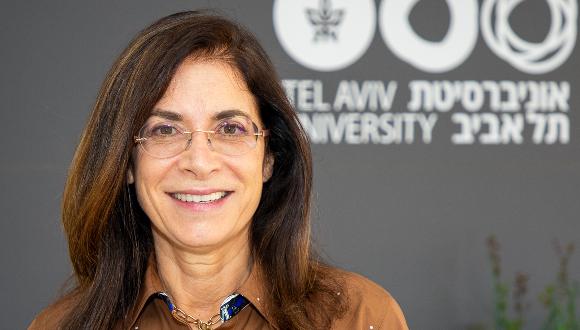Dafna Meitar-Nechmad
Chairwoman of the Board of Governors
CHAIRWOMAN’S MESSAGE
“Others talk about positive change. TAU does positive change.”
At the time of this Annual Report’s publication, Israel has endured over a year-and-a-half of a bitter, multi-front war. Especially in such difficult times, we can find a source of optimism and comfort in our involvement with Tel Aviv University.
First, we are an amazing worldwide community of researchers, teachers, students, alumni, friends and supporters, numbering in the hundreds of thousands in total. What a powerful force for change! We have recently taken steps to widen the circle of engagement through the NextGen Global Leadership community that has self-organized into working groups advancing campus and youth programs. Our annual Women’s Leadership Conference brings together influential Israeli women from politics, industry, business and academia — all of them proud graduates of TAU — to network and discuss how to contribute to Israeli society as a whole, and to women specifically. We should celebrate that while others talk about positive change, TAU does positive change.
Second, we can feel great pride in seeing the University’s scientific achievements that translate into smarter technologies, therapies, enterprises and social policies. And despite the ever-widening academic boycott movement (BDS), our excellent scientists continue to receive international recognition; for example, this year four of our engineers were inducted into the US National Academy of Inventors, where TAU makes up 70 percent of all Israeli members.
Third, we can find tremendous satisfaction in supporting Israel. TAU is the “up” in Startup Nation. We are the sharpener honing Israel’s technological edge. Much of the progress in security, the economy, healthcare, education, culture and more begins at Tel Aviv University. When the war is over and Israel rebuilds, TAU will stand at the forefront of national rejuvenation and we — the University’s supporters — can directly influence this important effort.
Fourth, we can regard the University as a leading institution representing Israel — and thereby brushing the country’s reputation in the global arena. When there is so much distress news coming out of Israel, and even more fake news about the Jewish state, TAU symbolizes all that we love about Israel. It is not surprising that world Jewry spotlights the remarkable people, entrepreneurial spirit and social responsibility of TAU to build up appreciation for the State of Israel itself.
Finally, I want to thank you — all our good friends and supporters — who help the University stay resilient, strong and optimistic. I extend special thanks to Jon and Mindy Gray for their recent extraordinarily generous donation to TAU, in benefit of healthcare and medical science in Israel, which brought us joy during troubled times.
This is an opportunity to express hope for the quick release of the remaining hostages, the return home of displaced communities, and more peaceful times for Israel and the region.
With warm regards,
Ms. Dafna Meitar-Nechmad
Chairwoman, Board of Governors
Tel Aviv University
Dafna Meitar-Nechmad has served as Chairwoman of the Tel Aviv University (TAU) Board of Governors since October 2021. Prior to that, she co-chaired TAU’s $1 billion global campaign, leading it to a successful conclusion after four years of visionary fundraising and international collaboration.
A former corporate attorney and partner at Meitar Law Offices, Dafna specialized in commercial, corporate, and telecommunications law. Over the past two decades, however, she has dedicated herself fully to the nonprofit sector in Israel.
In 2003, Dafna co-founded the Zvi and Ofra Meitar Family Fund with her father, supporting education, culture, and innovation in Israel and internationally. In 2014, she founded the Institute for Law and Philanthropy at TAU, placing philanthropic policy and research on Israel’s socio-economic agenda and leading the creation of the country’s first Donor-Advised Fund (DAF).
Dafna has held numerous philanthropic leadership roles, including:
• Chairperson of the Israeli Opera Friends’ Association (2005–2012)
• Board member of the Jewish Funders Network (JFN) since 2014, where she co-chaired the 2017 annual conference in Atlanta and has been instrumental in deepening Israeli-American philanthropic partnerships
• Member of Committed to Give, an Israeli initiative that promotes active and strategic giving among high-net-worth individuals
Her impact extends well beyond Israel. Dafna is the first and only Israeli to serve on the Metropolitan Opera’s Managing Director’s Committee (2013–2017) and as a member of its Advisory Committee (2017-2020). She also served as a member of the International Director’s Council of the Solomon R. Guggenheim Museum in New York (2014-2022).
As a philanthropist and a woman, Dafna is deeply committed to addressing gender inequality. In response to the COVID-19 crisis, she initiated the Women’s Philanthropy Leadership Group at JFN, promoting gender mainstreaming — the integration of a gender lens into the practices of donors and foundations.


